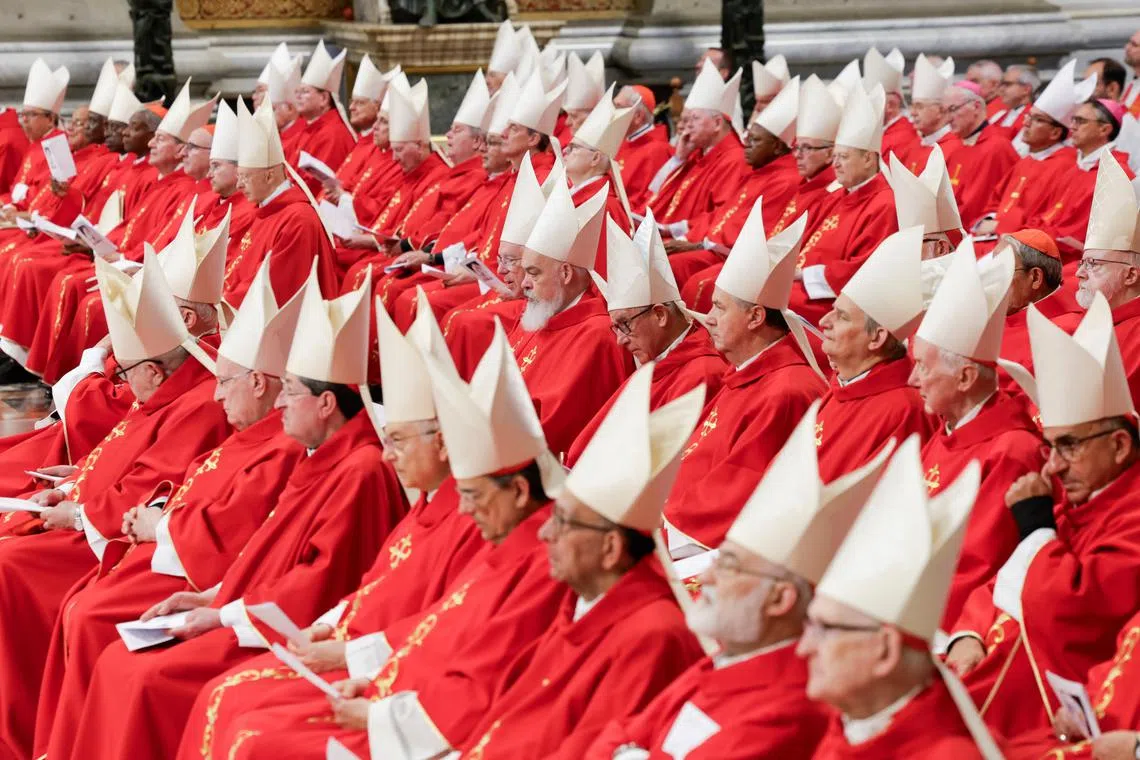Will Catholic cardinals pick another outsider like Francis to be pope?
Sign up now: Get ST's newsletters delivered to your inbox

Over 130 Cardinals are set to start the process of selecting a new pope on May 7.
PHOTO: REUTERS
VATICAN CITY – When Cardinal Jorge Bergoglio was elected in 2013 as Pope Francis, he was a near total Vatican outsider. He had never been a Vatican official, instead spending decades in local ministry. And he came from Argentina, the first Pope from the Americas.
As the world’s Catholic cardinals meet this week
“Pope Francis… shifted the Church’s attention to the outside world,” said Mr John Thavis, former Rome bureau chief for the Catholic News Service, who covered three papacies.
“Some cardinals will now be tempted to pick an insider, someone with the skills to manage church affairs more carefully and quietly than Francis did,” he said.
Pope Francis, who died on April 21
Many of his 47 foreign trips were to countries with small Catholic populations, such as South Sudan, Iraq and the United Arab Emirates, and he was especially committed to Catholic-Muslim dialogue.
He was also known for giving freewheeling press conferences, where no topics were off the table and the Pope might respond to a query with an unexpected quip.
Asked about the Catholic ban on birth control in 2015, Pope Francis reaffirmed the ban but added that Catholics do not have to have children “like rabbits”.
The late Pope’s unusually open style attracted criticism from some Catholics, but also global interest.
His funeral on April 26 and a procession through Rome to his burial place at the Basilica of St Mary Major attracted crowds estimated at more than 400,000.
German Cardinal Reinhard Marx, one of the leading Catholic prelates in Europe and once a senior adviser to Pope Francis, said the cardinals who will meet in a secret conclave to elect his successor would not be looking for a “functionary”.
“We do not need a manager,” Cardinal Marx told reporters. “What’s essential is that it be a courageous person… People around the world need to be comforted, lifted up.”
Other cardinals are expressing sharp disagreement.
“We need to give the Church back to the Catholics,” Italian Cardinal Camillo Ruini told the Corriere della Sera newspaper.
Cardinal Ruini, who is 94 and too old to enter the conclave, said Pope Francis sometimes appeared to favour those who were distant from the Church “at the expense” of devout faithful.
Others argue that it is precisely a more managerial pope that is needed at this time to tackle the Church’s financial woes, which include a widening budget shortfall and growing liabilities for its pension fund.
Cardinals’ speeches
The cardinals are meeting daily this week to discuss general issues facing the 1.4 billion-strong Church before those under the age of 80 enter the conclave on May 7.
As they meet in what are called “general congregations”, individual prelates can offer speeches to give their vision for the future of the global faith.
In 2013, Cardinal Bergoglio, then archbishop of Buenos Aires, offered a short reflection at one such meeting, saying the Church needed to do a better job of opening itself up to the modern world. This, by many accounts, proved decisive for his election.
“Bergoglio gave the speech which led the cardinals to believe that the Holy Spirit had made its choice,” said Mr Austen Ivereigh, a biographer of Francis who also wrote a book with the Pope in 2020.
“The choice that (Bergoglio) gave them, and the proposal for what the next pope should do, just struck them very, very forcefully,” said Mr Ivereigh.
It remains to be seen whether any cardinal can give such a compelling speech this week.
Pope Francis made a priority of appointing cardinals from countries that have never had them, such as Myanmar, Haiti and Rwanda, and many of the roughly 135 cardinals expected to enter the conclave do not know each other well.
They may be looking at Pope Francis as a model and choose another outsider. Or they may look at Pope Francis’ own predecessor, Pope Benedict XVI – a consummate insider who worked as a senior Vatican official for nearly two decades before becoming pontiff.
Mr Thavis said he thought the large crowds who came to mourn Pope Francis might affect the cardinals’ decision.
“The cardinals witnessed an outpouring of love and respect for Francis,” he said. “It’s one more reason why the ability to connect with people will weigh more than managerial skills as they make their choice.” REUTERS


